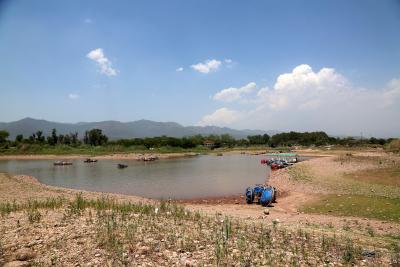Unregulated groundwater extraction poses threat to Pakistan’s environmental stability: Report
By IANS | Updated: September 4, 2025 19:45 IST2025-09-04T19:41:55+5:302025-09-04T19:45:27+5:30
Islamabad, Sep 4 Pakistan is standing at the precipice of an environmental catastrophe due to climate change and ...

Unregulated groundwater extraction poses threat to Pakistan’s environmental stability: Report
Islamabad, Sep 4 Pakistan is standing at the precipice of an environmental catastrophe due to climate change and country’s own unchecked exploitation of its vital resource: water. Unchecked groundwater extraction is an existential threat to Pakistan's environmental and social stability, a report has stated.
During a recent event titled 'Building Water-Sensitive Communities: Collaborative Solutions for Freshwater Sustainability', experts have warned of the deepening crisis facing Pakistan’s freshwater ecosystems, a report in Islam Khabar stated. Water has always remained central for survival of Pakistan with the Indus River system being the lifeline of Pakistan, supporting agriculture, industries, and people's use. However, the demand of water in Pakistan, along with poor regulation and outdated practices, has pushed groundwater reserves towards dangerous depletion.
"Masood Arshad, Senior Director of WWF’s Freshwater Programme, underscored the gravity of the crisis, pointing to how the unregulated pumping of groundwater is damaging fragile ecosystems. Across the Indus, Keenjhar Lake, and the Ravi River, the signs of collapse are increasingly visible: shrinking wetlands, vanishing fish populations, and rising water salinity. This problem is compounded by Pakistan’s demographic and agricultural pressures," the report highlighted
With the population of over 240 million people, demand for water continues to rise in Pakistan. However, conservation and regulation remains virtually absent. Farmers depend heavily on tubewells to irrigate their fields. Urban centres also carry out reckless over-extraction, with groundwater being as the main source of drinking water for millions of homes.
The report said, "The Indus River, once a mighty artery flowing through the length of the country, is increasingly reduced to a shadow of itself. Excessive extraction, coupled with upstream diversions and the impacts of climate change, has left vast stretches of the river struggling to maintain flow. The ecological consequences are dire."
Keenjhar Lake, one of Pakistan’s largest freshwater lakes and a critical Ramsar site, is also under threat. Overextraction from groundwater reserves feeding the lake, along with pollution and mismanagement, has turned this ecosystem into a declining habitat. Meanwhile, the Ravi River, which was once a vibrant waterway, is now choked by unchecked pollution and reduced flows due to groundwater extraction.
"Groundwater depletion does not exist in isolation. It compounds Pakistan’s vulnerability to climate shocks, amplifying the devastation wrought by extreme weather. The 2022 monsoon floods, which submerged a third of the country and displaced millions, served as a brutal reminder of how fragile the nation’s water management system has become," Islam Khabar report mentioned.
The almost non-existent regulation for groundwater extraction results in people, industries and farmers being free to exploit reserves unchecked. The report said, "Unchecked groundwater extraction is not simply a technical issue—it is an existential threat to Pakistan’s environmental and social stability. The degradation of the Indus, Keenjhar Lake, and the Ravi River reflects a larger unravelling of ecosystems that have long supported the nation’s people. Each passing year of over-extraction digs the country deeper into a crisis that will not easily be reversed. The continued collapse of freshwater systems leaves Pakistan more exposed to food insecurity, health crises, and climate-driven disasters."
Disclaimer: This post has been auto-published from an agency feed without any modifications to the text and has not been reviewed by an editor
Open in app